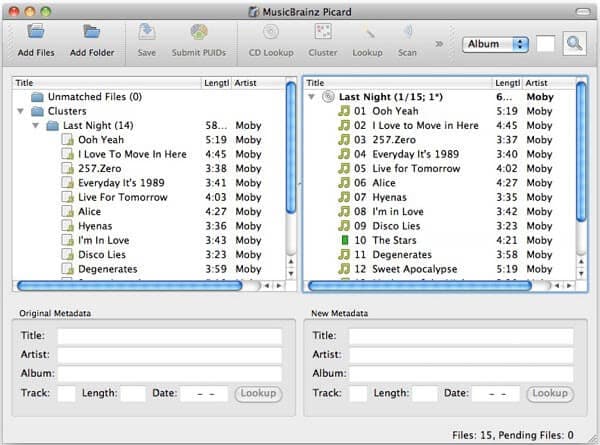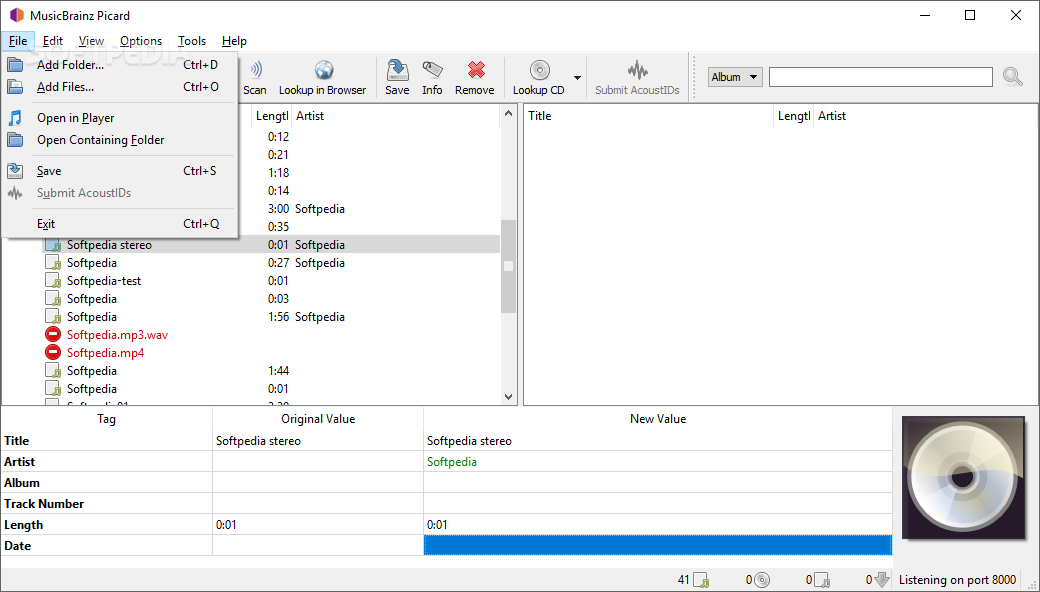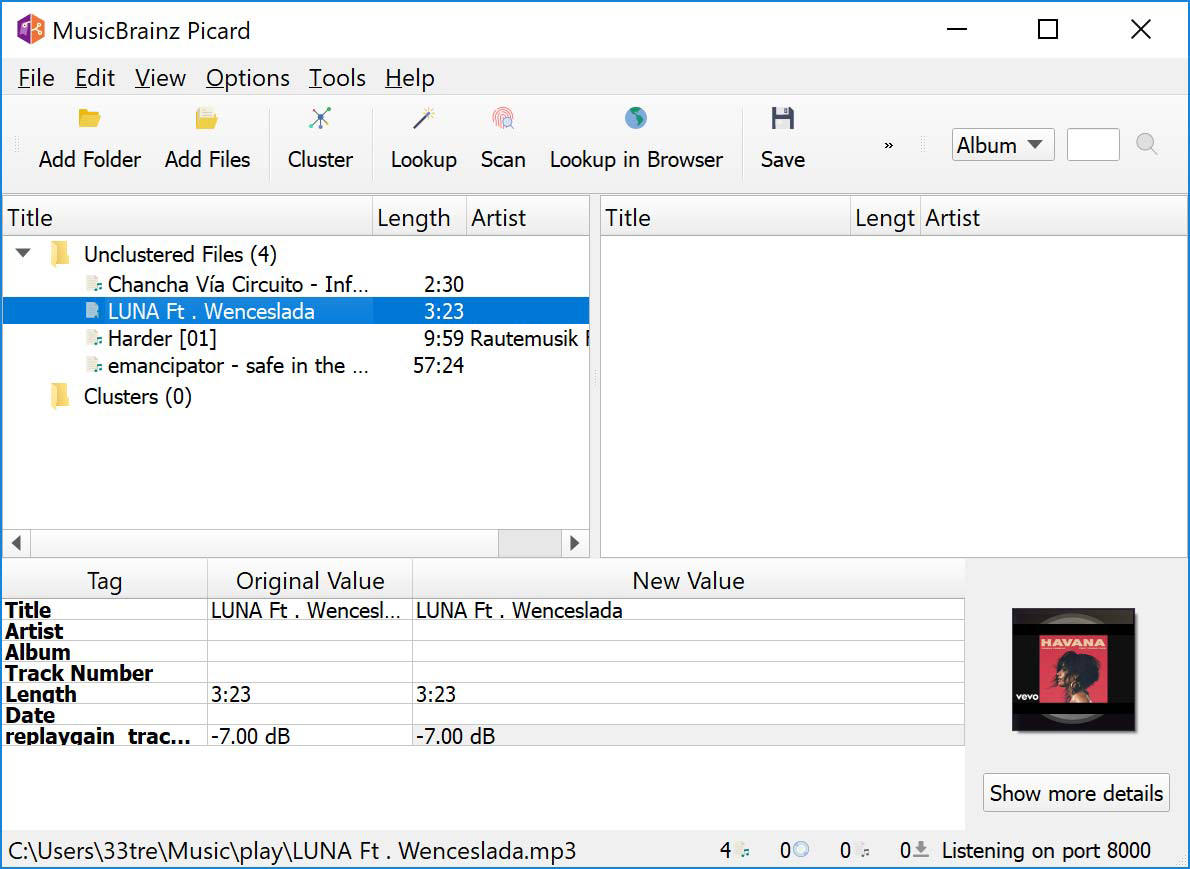

- Musicbrainz picard mass edit file name software#
- Musicbrainz picard mass edit file name code#
- Musicbrainz picard mass edit file name series#
- Musicbrainz picard mass edit file name free#
- Musicbrainz picard mass edit file name windows#
If this is the case, it's recommended to click a track and compare the metadata using the Original Values and New Values at the bottom of picard window. Red and orange, it could mean that Picard has guessed wrong, or that your files didn't have > yellow > orange > red, where green is the best match. Click the green TAGGER button.ĭrag the clustered album onto the album that was just opened, if it didn't happen automatically.ĭepending on your previous metadata, Picard will try to guess the matching tracks. Pay attention to the amount of tracks in each album, and pick the one you have. Your default browser will open and allow you to find the right album manually. If nothing happened when you clicked the Lookup or Scan toolbar button, click the Lookup in Browser button toolbar button. Since you are a new Picard user, we recommend that you read the steps in betweenĪlternatively, you can also try to use the Scan toolbar button to lookup files using their AcoustID, which is a unique finger-print associated with each recording. On your previous metadata, album will show up in the right-hand pane. Select a clustered album and click the Lookup toolbar button to look the cluster up. Wait for Picard to process the files (the names will turn from grey to black) and then click the Cluster toolbarīutton to cluster files into album clusters. Click on the View menu and then select File Browserĭrag a folder to the Unmatched Files folder in the right-hand pane. For ease of use it is recommended to use the File Browser to manage file system interactions. Add your files using the Add Files or Add Folder toolbar buttons.Picard believes in quality over quantity and provides a plethora of customizations to tweak music collections to your needs. You should note - Picard is not built to be a mass single-track tag fixer. In 2018, Picard 2.0 was released with support for Python 3, PyQt5 and a new and improved UI.This quick start guide describes how you can tag your files using In 2017, Picard's development version was made available on PyPi, supporting Windows, Linux and macOS. In 2009, Picard's developers replaced the MusicDNS acoustic fingerprinting system with AcoustID.
Musicbrainz picard mass edit file name software#
The developers also switched from a software library called wxPython to another called PyQt, and ported Picard to the operating systems Linux and macOS. When the new software identified tracks, it grouped them by album in a collapsible tree view. With funding from RealNetworks, MusicBrainz developers designed a new user interface for Picard. Although Kaye intended the name Picard to be temporary, MusicBrainz Picard remains the official name of the program.
Musicbrainz picard mass edit file name series#
Since Kaye was trying to make a "next-generation tagger", he thought of the science fiction television series Star Trek: The Next Generation, in which Patrick Stewart plays the role of Captain Jean-Luc Picard.


Musicbrainz picard mass edit file name code#
Īs a sponsor of the development project, RealNetworks asked Kaye to come up with a project code name. Streaming media company RealNetworks took an interest in MusicBrainz, and gave the developers a grant to improve the Tagger software. However, Kaye saw that it needed cosmetic and functional improvements. This early incarnation of the program could identify songs based on tags or MusicDNS acoustic fingerprints.
Musicbrainz picard mass edit file name windows#
It was developed in the Python programming language, and ran only on Microsoft Windows operating systems. Picard began as a tag editor called the MusicBrainz Tagger, which was the work of MusicBrainz founder Robert Kaye and other volunteers. It is named for Captain Jean-Luc Picard, a character in the US television series Star Trek: The Next Generation. MusicBrainz Picard has tag editing features, and is extensible with plug-ins. The more information the database has about a recording, the more Picard can embed in users' audio files. The source of this information is the MusicBrainz database, which is curated by volunteers. In some cases, it can also add more detailed information, such as lists of performers and their instruments. When Picard identifies an audio file, it can add new information to it, such as the recording artist, the album title, the record label, and the date of release. Audio file metadata (or "tags") are a means for storing information about a recording in the file. Picard identifies audio files and Compact Discs by comparing either their metadata or their acoustic fingerprints with records in the database. It was developed by the MetaBrainz Foundation, a non-profit company that also operates the MusicBrainz database.
Musicbrainz picard mass edit file name free#
MusicBrainz Picard is a free and open-source software application for identifying, tagging, and organising digital audio recordings.


 0 kommentar(er)
0 kommentar(er)
